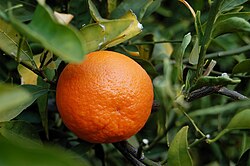Typical yield
17.3 t/ha
Varieties
3
Pest/Disease
8
Seasons
3
Profile
- Growth habit
- tree
- Lifecycle (days)
- perennial
- Primary uses
- Fresh fruit; juice/processing
- Pollination
- insect
- Origin / distribution
- SE Asia origin; grown in humid/semi-humid tropics & subtropics
Environment
Climate
Temp optimal
20–30 °C
Rain optimal
900–1400 mm/yr
Altitude
0–1800 m
Soil
pH optimal
6–7
Soil type
Deep, well-drained loam/sandy loam; high organic matter
Farmer Guide
Row spacing
600 cm
Plant spacing
600 cm
Depth
0 cm
Seed rate
kg/ha
Nursery days
270
Planting: Plant at onset of rains or irrigate; incorporate compost and starter P; stake and mulch young trees.
Transplanting: Protect from wind and sunscald; maintain weed-free basins.
Irrigation: Even moisture, especially bloom to fruit fill; avoid prolonged drought/ponding.
Fertigation: Split N into multiple light feeds; ensure K and Ca/Mg; adjust via leaf tests.
Pest scouting: Scout for citrus fruit flies, aphids, scales/mealybugs, psyllids (HLB risk), canker and Phytophthora.
Pruning/Training: Form strong framework; remove suckers and crossing wood; open canopy for light and airflow.
Harvest: Harvest at full color and maturity index (°Brix/acid); clip to avoid rind tearing.
Postharvest: Shade-cool; handle gently; store 5–10 °C at high RH; avoid condensation and decay.
Nutrient Schedule
| # | Stage | DAP | Product | Rate | Targets (kg/ha) | Notes |
|---|---|---|---|---|---|---|
| 1 | Basal at planting | 0 | Compost + DAP 18-46-0 (light) | 5 kg/tree (compost) + 100 g DAP | N: —, P₂O₅: 10, K₂O: — | Mix in backfill; keep fertilizer off stem |
| 2 | Vegetative split N | 90 | CAN 26% N | 150 g/tree | N: 10, P₂O₅: —, K₂O: — | Ring-apply under canopy; water in |
| 3 | Pre-bloom balanced | 250 | NPK 17-17-17 | 200 g/tree | N: 10, P₂O₅: 10, K₂O: 10 | Light dose before bloom |
| 4 | Fruit fill K boost | 320 | Sulfate of potash (SOP) | 250 g/tree | N: —, P₂O₅: —, K₂O: 20 | Prefer SOP for fruit quality |
| 5 | Micronutrient foliar | 300 | Zn/Mn/B foliar (as label) | 0 — | N: —, P₂O₅: —, K₂O: — | Apply during cool hours |
Nutrient Requirements
| Nutrient | Stage | Amount | Unit |
|---|---|---|---|
| N | Basal | 60 | kg/ha |
| P₂O₅ | Basal | 40 | kg/ha |
| K₂O | Basal | 80 | kg/ha |
| N | Establishment | 20 | kg/ha |
| P₂O₅ | Establishment | 20 | kg/ha |
| K₂O | Establishment | 20 | kg/ha |
| N | Vegetative | 50 | kg/ha |
| K₂O | Vegetative | 40 | kg/ha |
| N | Flower_set | 20 | kg/ha |
| P₂O₅ | Flower_set | 20 | kg/ha |
| K₂O | Flower_set | 40 | kg/ha |
| N | Fruit_fill | 10 | kg/ha |
| K₂O | Fruit_fill | 60 | kg/ha |
| N | Maintenance | 40 | kg/ha |
| P₂O₅ | Maintenance | 10 | kg/ha |
| K₂O | Maintenance | 40 | kg/ha |
Images

| Name | Country | Maturity | Traits |
|---|---|---|---|
| Local Tangerine | KE | 720 | Sweet; easy peel |
| Local mandarin selection | KE | 900 | Good peelability; fresh market |
| Clementine-type selection | TZ | 900 | High juice; sweet; small–medium fruit |
| Stage | Product | Rate (kg/ha) | Notes |
|---|---|---|---|
| Basal | Compost (well-decomposed) | 4000 | Mulch rings |
| Vegetative | CAN 26% N | 80 | Split 2–3× on young trees |
| Fruit fill | Sulfate of potash (SOP) | 60 | Quality improvement |
| Name | Type | Symptoms | Management |
|---|---|---|---|
| Citrus psyllid | pest | Leaf curling; honeydew | Monitoring; IPM; prune |
| Fruit flies (Tephritidae) | pest | Stings; larval tunnels; fruit drop | Protein baiting; sanitation; fruit bagging; timely harvest |
| Citrus aphids | pest | Leaf curl; honeydew/sooty mold; virus risk | Control ants; conserve predators; selective sprays if needed |
| Scales & mealybugs | pest | Sticky honeydew; sooty mold; twig decline | Prune for airflow; oils/soft insecticides; biological control |
| Citrus psyllid (HLB vector) | pest | Shoot distortion; HLB risk | Vector monitoring; rogue infected plants; IPM program |
| Citrus canker | disease | Corky lesions on leaves/fruit | Sanitation; windbreaks; copper protectants |
| Phytophthora gummosis/root rot | disease | Gum exudation; collar rot; decline | Good drainage; avoid trunk wetting; phosphonates if needed |
| Greasy spot/sooty blotch | disease | Leaf spots; premature drop | Canopy opening; protectants in wet weather |
| System | Typical | Min | Max | Notes |
|---|---|---|---|---|
| orchard | 15 | 8 | 25 | |
| smallholder rainfed | 12 | 8 | 18 | 25–50 kg/tree common at maturity |
| irrigated/intensive | 25 | 15 | 35 | Good cultivars, pruning, nutrition |
| Country | Region | Planting | Harvest |
|---|---|---|---|
| KE | Coastal & mid-altitudes (long rains) | Mar–Apr | Jul–Nov |
| KE | Coastal & mid-altitudes (short rains) | Oct–Nov | Feb–Jun |
| TZ | Coastal belt | Mar–Apr | Aug–Dec |
| Country | Region | Suitability |
|---|---|---|
| KE | Coastal & mid-altitudes | High |
| KE | Cool highlands (>1800 m) | Low |
| KE | Low to mid-altitudes | High |
| TZ | Coastal belt & isles | High |
| UG | Warm lowlands (lake shore) | Medium |
